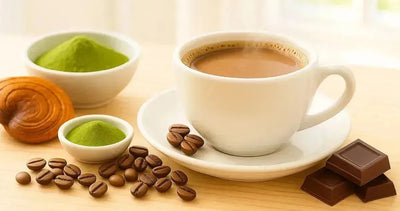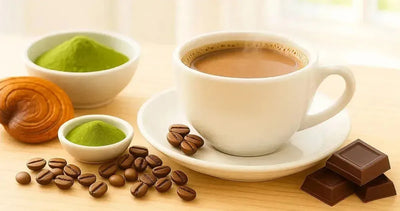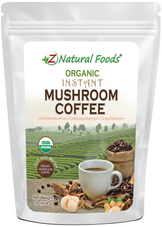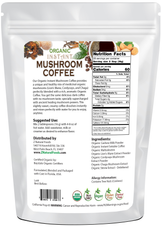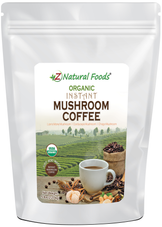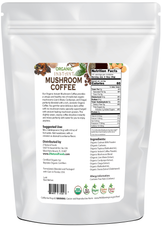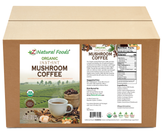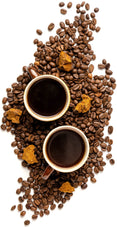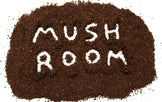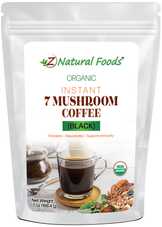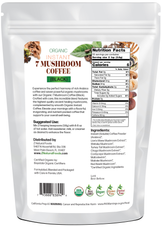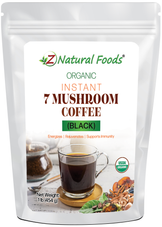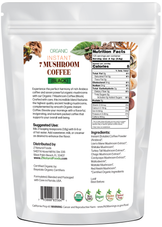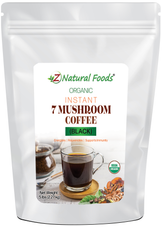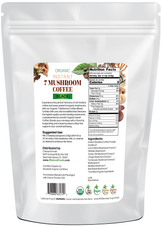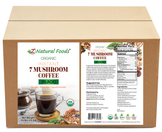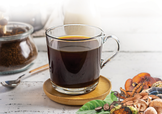Description
Description
Debunking The Myths and Exploring the Health Benefits of Mushroom Coffee
It is well known that Z Natural Foods creates and delivers to our customers delicious, highly nourishing, broad-spectrum functional food blends in their most versatile form, sourced from the best foods around the world.
However, we also take great pride in mastering the process of recreating classics and popular blends already on the market by taking additional steps to improve them over our competition in flavor, texture profile, and, most importantly, nourishing capabilities. Mastering the creation or recreation of a product ensures that each food that goes into a blend is in its most bioavailable, nourishing form. We carefully select each ingredient to ensure the perfect flavor and texture profile.
Our Organic Instant 7 Mushroom Coffee is an ideal example.
Today, we invite you to follow along in this comprehensive guide as we debunk some of the top myths about instant mushroom coffee and discuss its nourishing benefits and versatility.
With a long-standing reputation for being bitter, cheap, unsatisfying, and insulting to your taste buds, today’s instant coffee products differ significantly from what your grandparents used to drink.
It was not uncommon that if your first coffee experience was a cup of instant coffee, you probably never drank coffee again.
Well, that has all changed, and thanks to technology, we can now enjoy a deliciously bold and flavorful cup of instant coffee. While it will never replace the more traditional methods for making a cup of coffee, if produced correctly, today's instant coffee can hold its head high and take second place on the winner's podium.
More importantly, it allows for greater versatility and creativity. The coffee world's once-known adopted middle child is back with a vengeance and demands respect.
Until recently, coffee had a bad reputation and was considered unhealthful.
However, recent research on the benefits of polyphenols and our better understanding of all the potent compounds in coffee are changing that perspective. Here are some reasons why:
-
According to the Phenol-Explorer database, coffee was ranked #11 in the top 100 best antioxidant foods.
-
There are over 8,000 different types of flavonoids in nature. Research shows that it does not seem to matter whether you acquire them from food or supplements; what matters is the total daily amount you consume.
-
Experts also believe we should consume 500 to 2000 milligrams of flavonoids daily, sourced from various foods and supplements.
-
One cup of coffee provides 400-600 milligrams of polyphenolic compounds(12 ounces of decaf provides 400 milligrams).
However, when you add mushroom-fruiting body extracts to your coffee, you have gone from a nourishing beverage to a potent tonic.
Mushrooms contain a wide range of nourishing compounds.
Polysaccharides are believed to be mushrooms' primary family of compounds that may support a healthy aging process. Mushrooms contain a wide range of non-starch polysaccharides (carbohydrate fractions excluding starch and free sugar) like chitin, beta-glucans, alpha-glucans, hemicellulose, mannans, xylans, and galactan's.
Non-starch polysaccharides are distinguished into soluble and insoluble fractions, with up to 90% being insoluble fractions. Most (around 80%) of insoluble polysaccharides are chitin, including beta-glucans bound onto chitin or protein.
Polysaccharides can support a wide range of actions in the human body.
They have been shown to have immunological, neurogenic, cardiovascular, and microbiome effects and a host of other nourishing qualities.
Until recently, it was believed that the primary polysaccharides found in fungi are beta-D-glucans, which come in various forms (beta 1-3 and 1-6) and are the powerhouse for what makes mushrooms work. Other polysaccharides found in mushrooms are Alpha-glucans like glycogen, dextran, pullulan, and starch, which, for a long time, were not thought to provide the same nourishing qualities as beta-glucans. Modern research has taught us that this belief tells you only part of the story and may be based on flawed science.
While beta-glucans are potent compounds, there are hundreds of beta-glucan shapes and sizes, and while some are biologically active, others are not. Furthermore, not all are immunologically active. Ultimately, they are just one variable of a wide range of compounds responsible for a mushroom's many nourishing qualities. From tradition to science, medicinal mushrooms have proven their value as potent tonics with great versatility.
Therefore, it should come as no surprise that mushroom coffee’s rise in popularity has overtaken the coffee industry in many ways.
Now, let's discuss some of the most common myths about mushroom coffee.
Myth #1: Mushroom Coffee tastes like mushrooms?
Generally speaking, mushroom coffee tastes similar to regular coffee but has a slightly earthy flavor, depending on the type of mushrooms, parts (fruiting body vs mycelium), and form (whole vs extract) used.
The mushroom flavor is usually subtle and not overpowering. Adding foods like cacao and vanilla extract to your mushroom coffee can support a more balanced flavor profile. Remember that changing the coffee or mushrooms used in the mix can change the flavor profile, depending on the notes and undertones of the coffee you choose to make it with.
However, to debunk this myth, we must discuss the most critical factor when creating mushroom coffee. The quality and purity of the base ingredients (instant coffee and medicinal mushrooms) will ultimately determine the result of the end product.
For many years, there has been a debate about which species of coffee beans are superior in terms of antioxidant and flavor profile.
While it has always been believed that robusta beans are of lower quality, that is untrue.
Over the years, we have learned that each species' growth and processing determine its flavor profiles. Each species has unique characteristics that create an exceptional cup of coffee.
Here are some facts about these two species of coffee beans:
-
Arabica beans have a smoother and sweeter taste. They are known for their chocolate notes and fruity undertones, providing a balanced flavor profile. In contrast, robustas' flavor profile is described as deep and bold, with nutty undertones.
-
These differences in flavor profiles are often due to how the beans are processed. Robusta is naturally processed, and arabica is washed. Arabica is more costly because it requires specific growing conditions (above 3000 feet and only subtropical climates) and is more labor intensive.
-
The difference in flavor profile is also caused by robusta beans having 60% less naturally occurring sugar and fatty acids, which creates its deep and bold flavor.
-
While robusta is hardy and highly resistant to weather, pests, and disease, arabica beans are more delicate and less resistant to those external factors.
-
Robusta has almost twice the amount of caffeine as arabica.
Finally, the drying process is crucial to creating a better end product. The switch from spray-drying to freeze-drying and its advancement has elevated the quality of instant coffee.
Let's delve into these two methods to understand the difference:
-
Spray-drying method: This method is a testament to efficiency and practicality. The coffee extract is efficiently sprayed into a stream of hot air, and as the droplets descend through a tall cylinder, they dry and transform into a fine powder. This powder then undergoes further processing, which texturizes it into granules. This method, renowned for its cost-effectiveness, is a practical choice for those seeking an economical option, even if it may produce a product that some might perceive as lower quality. One of the trade-offs of this method is that the coffee may lose some of its flavor, but it remains a popular choice for its affordability.
-
The freeze-drying method, in contrast, is a testament to precision and quality. It begins with meticulous roasting, grinding, and extraction of the beans. The extracted coffee then undergoes a low-temperature water removal and foaming process to enhance its volume and solubility. The product is then placed into a cold room, frozen at a chilling negative 50 degrees, and finally granulated. These smaller granules are dried in a vacuum at a slightly higher temperature; then heat is applied, causing ice crystals to transition into gas, resulting in freeze-dried coffee granules. This intricate process yields a more flavorful and aromatic instant coffee, making it a top choice for coffee enthusiasts.
Ultimately, the flavor profile of your mushroom coffee will depend on the base ingredients and what you add to it.
Myth #2: Mushroom coffee has no health benefits
The mountain of research discussing the nourishing benefits of coffee and medicinal mushrooms clearly debunks this inaccurate and foolish myth.
Here are just a few simple examples:
1) In a study discussing the effects of coffee consumption on subclinical inflammation and other risk factors for type 2 diabetes, the following was stated:
-
Coffee consumption increased coffee-derived compounds, mainly serum caffeine, chlorogenic acid, and caffeic acid metabolites.
-
Significant changes were also observed for serum concentrations of interleukin-18, 8-isoprostane, and adiponectin (medians: -8 %, -16 %, and 6%, respectively; consumption of 8 cups compared with 0 cups of coffee/d).
-
Serum concentrations of total cholesterol, HDL cholesterol, and apolipoprotein A-I increased significantly by 12%, 7%, and 4%, respectively, whereas the ratios of LDL to HDL cholesterol and of apolipoprotein B to apolipoprotein A-I decreased significantly by 8% and 9%, respectively (8 cups coffee/d compared with 0 cups).
The following was concluded from this study. “Coffee consumption appears to have beneficial effects on subclinical inflammation and HDL cholesterol, whereas no changes in glucose metabolism were found in our study. Furthermore, many coffee-derived methylxanthines and caffeic acid metabolites appear useful as coffee intake biomarkers.”
2) In a randomized controlled trial looking at the effects Lion’s Mane has on depression and anxiety after four weeks, “Our results show that HE intake can reduce depression and anxiety, and these results suggest a different mechanism from NGF-enhancing action of H. Erinaceus.” This study suggests that Lion’s Mane does not increase serotonin levels but stabilizes blood serotonin levels and dopamine. This may show significant benefits in depressed people.
3) A double-blind, placebo-controlled study using 28 individuals examined whether acute and chronic supplementation of cordyceps improves tolerance to high-intensity exercise.
-
“One week of supplementation elicited no significant time × treatment interaction for VO2max (p=0.364), VT (p=0.514), TTE (p=0.540), RPP (p=0.134), AvgP (p=0.398), or %drop (p=0.823).”
-
“After three weeks, VO2max significantly improved (p=0.042) in MR (+4.8 ml·kg−1·min−1), but not PL (+0.9 ml·kg−1·min−1). Analysis of 95% confidence intervals revealed significant improvements in TTE after 1- (+28.1 s) and three weeks (+69.8 s) in MR, but not PL, with additional improvements in VO2max (+4.8 ml·kg−1·min−1) and VT (+0.7 l·min−1) after 3-weeks.”
Therefore, it was concluded, “Acute supplementation with a cordyceps militaris containing mushroom blend may improve tolerance to high-intensity exercise; greater benefits may be elicited with consistent chronic supplementation.”
Myth #3: Mushroom Coffee is just a marketing gimmick
It is no myth that the purpose of marketing, in general, is to focus on showing you the positive attributes of a product. It is also true that not all products are created equal.
Therefore, if you had a negative or benign experience with a specific product, assuming that what you were told via marketing can be considered misleading on the surface is not unreasonable.
However, because the devil is in the details, you need to look at aspects like the quality, whether the ingredients are presented in their most bioavailable form, and the quantity suggested for optimal results before jumping to conclusions about the product's effectiveness.
While the health benefits can vary depending on the type of mushroom used, they are used for a wide range of conditions in Western medicine. Mushrooms are also considered significant tonics in TCM (Traditional Chinese Medicine). Tonics are not used to treat or prevent specific issues. They promote and support general well-being by enhancing energy and regulating function. The priority is not healing but gently promoting one’s health. Tonics provide adaptive Qi, allowing us to deal more efficiently with daily stressors and enable us to grow as human beings.
Ultimately, combining medicinal mushrooms with coffee creates a more balanced and nourishing tonic beverage.
Myth #4: Mushroom coffee has significant side effects.
We will begin by stating the following… There will always be exceptions to what is considered generally safe for everyone. While most people tolerate mushrooms and coffee quite reasonably, that does not mean you necessarily will. Therefore, if you are aware of any allergies to mushrooms, are sensitive to caffeine, or are pregnant or breastfeeding, you should consult with a healthcare provider before consuming it.
Caffeine: Is it really bad for us?
Before you judge caffeine as good or bad, consider these facts:
-
Instant coffee has, on average, 40% less caffeine than brewed coffee.
-
Stimulants are a broad class of compounds and drugs that specifically increase the activity of the central nervous system: alertness, attention, energy, and physical activity.
-
Two of coffee's primary components are caffeine and a family of compounds called chlorogenic acids.
The mechanisms of action for caffeine are mediated in four different ways:
-
Antagonism of adenosine receptors
-
Inhibition of phosphodiesterase
-
The release of calcium from intracellular stores
-
Antagonism of benzodiazepine receptors (used to reverse sedative effects)
While significant research supports the safety and benefits of coffee and mushrooms for human consumption, no conclusive studies specifically discuss this combination's doses and upper limits.
Therefore, while everyone has their own tolerance level for caffeine, it is always best not to exceed the 200-300 mg range in a 24-hour period. Furthermore, while we can’t speak for other products, our mushroom coffee blend contains medicinal mushrooms well within the range of what is considered safe and effective.
Myth #5: Mushroom Coffee contains psychedelic substances.
No evidence supports the claim that mushroom coffee products with cordyceps, shiitake, maitake, lion’s mane, reishi, turkey tail, and Chaga contain psychedelic compounds. Psychedelic Mushrooms contain psilocybin and psilocin and can affect all the senses, altering a person's thinking, sense of time, and emotions. Johns Hopkins Center for Psychedelic and Consciousness Research is at the forefront of psychedelic mushroom research as a potential therapy for a wide range of psychiatric and behavioral disorders like depression, OCD, addiction, and end-of-life psychological distress.
-
Here is their paper for guidelines and safety regarding these types of therapies.
However, according to the DEA, “Psilocybin is a Schedule I substance under the Controlled Substances Act, meaning that it has a high potential for abuse, no currently accepted medical use in treatment in the United States, and a lack of accepted safety for use under medical supervision.”
Tips for choosing a quality mushroom coffee product
1) Choose a product that uses arabica coffee beans and, if possible, freeze-dried. As stated above, most people don’t want an overpowering mushroom flavor, and arabica beans have a smoother and sweeter taste with fruity undertones.
2) Look for products that specify that their mushrooms are fruiting body extracts. Mushrooms that have been dried and milled into a powder will be less effective overall, especially in the moderate amounts you find in mushroom coffee. Furthermore, with extracts, you are getting a higher concentration. So, getting 500 milligrams of a 10:1 extract powder is far more potent than getting 500 milligrams of a whole mushroom powder.
3) If you are looking for convenience and concerned about texture, avoid mushroom coffee products that use the mycelium portion of the mushroom. These products tend to have a more gritty texture and don’t mix as quickly as a fruiting body extract powder.
4) Look for companies that give you options for a black coffee version and one that contains a plant-based creamer. Some people like the idea of an all-in-one mushroom coffee product. However, companies that only offer a sweetened product with a creamer built-in limit your ability to create your version of a perfect tonic coffee.
5) Always try to opt for an organic product. While organic products are not perfect, they are often a better choice with much less risk of contamination.
The following was stated in an article by the Mayo Clinic regarding organic foods:
-
Organic food exposes people to less pesticide residue than does conventionally grown food.
-
Unlike conventional foods, food labeled as organic can't be treated with radiation, a process called irradiation. When food is treated in this way, rays pass through the food, like the sun passing through a window.
Why you should consider adding mushrooms to your coffee
Finally, here are reasons to consider using a mushroom coffee blend or adding a variety of mushrooms to your coffee.
For starters, some of coffee's most universally accepted negative aspects are the feeling of being overstimulated and the mid-day crash.
As stated several times throughout this guide, while all mushrooms contain the same compounds proven to support various aspects of human health, each mushroom has unique properties.
Generally speaking, medicinal mushrooms add a level of nourishment and charge as Traditional Chinese Medicine (TCM) believes that coffee can be a “depleting” beverage on a deep, energetic level. However, specific mushrooms can support and downregulate coffee's “negative” attributes.
For example, according to TCM, the reishi mushroom is known to nourish, harmonize, and soothe the root of the spirit or consciousness (AKA The Shen) that lives in the heart. Therefore, adding reishi extract will create a calmer, more balanced effect on the coffee while supporting nourishment on a deep level. Another example is the lion’s mane mushroom, a calming tonic that supports stress and anxiety. Ultimately, when we speak about nourishing on a deep level, we are speaking of our reservoir of energy, or what TCM calls Jing.
Medicinal mushrooms are the perfect tonics for that job.
In conclusion, here at Z Natural Foods, we believe that everyone should embrace the opportunity to make what they are consuming better and more effective to support overall health. Mushroom coffee is a perfect example of this idea. This simple blending of two potent categories of food creates something extraordinary. We think nothing is more powerful than combining long-standing traditions with science to versatile products that bring enjoyment to your taste buds so you can live the life you were meant to live.
For more information about our Mushroom Coffees, go here:
For more information about all of our Coffee & Teas, go here:
For more information about all of our Mushroom Powders, go here:
About Michael Stuchiner, Master Herbalist
Michael Stuchiner is a Master Herbalist and proud graduate of The School of Natural Healing and has worked in different areas of this field for over 25 years. He is a retired elite-level powerlifter who competed for 27 years. As an avid international traveler, he is passionate about the use of medicinal and tonic herbs, as well as foods traditionally found in local markets in the 35 countries he has visited. Michael brings you his years of experience as a Master Herbalist, traveler, and athlete through the hundreds of articles he has written and his YouTube channel (A Master Herbalist Perspective). He is considered a true educator in this field. For more articles written by Mike, go here: Master Herbalist.

